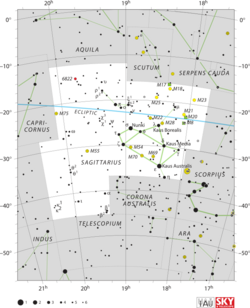Astronomy:Nu1 Sagittarii
| Observation data Equinox J2000.0]] (ICRS) | |
|---|---|
| Constellation | Sagittarius |
| Right ascension | 18h 54m 10.17695s[1] |
| Declination | −22° 44′ 41.4247″[1] |
| Apparent magnitude (V) | +4.86[2] |
| Characteristics | |
| Spectral type | G2/K1 Ib/II + B9.2p[3] |
| U−B color index | +1.34[2] |
| B−V color index | +1.43[2] |
| Astrometry | |
| Radial velocity (Rv) | −11.57[4] km/s |
| Proper motion (μ) | RA: +4.291[4] mas/yr Dec.: −7.786[4] mas/yr |
| Parallax (π) | 2.3170 ± 0.2139[4] mas |
| Distance | 1,400 ± 100 ly (430 ± 40 pc) |
| Absolute magnitude (MV) | −3.91[5] |
| Details | |
| Radius | 101[4] R☉ |
| Luminosity | 3,464[4] L☉ |
| Temperature | 4,401[4] K |
| Other designations | |
| Database references | |
| SIMBAD | data |
Nu1 Sagittarii (ν1 Sagittarii, abbreviated Nu1 Sgr, ν1 Sgr) is a triple star system[7] about 1,100 light-years from Earth. Its three components are designated Nu1 Sagittarii A (officially named Ainalrami /ɛnəlˈreɪmi/, the traditional name for the system),[8] B and C.[9] A and B themselves form a spectroscopic binary.[7] The system is 0.11 degree north of the ecliptic.
Nomenclature
ν1 Sagittarii (Latinised to Nu1 Sagittarii) is the system's Bayer designation.
Nu1 and Nu2 Sagittarii (together designated Nu Sagittarii) bore the traditional name Ain al Rami, which is from the Arabic عين الرامي ʽain al-rāmī meaning 'eye of the archer'.[10] In 2016, the IAU organized a Working Group on Star Names (WGSN)[11] to catalog and standardize proper names for stars. The WGSN decided to attribute proper names to individual stars rather than entire multiple systems.[12] It approved the name Ainalrami for the component Nu1 Sagittarii A on 5 September 2017 and it is now so included in the List of IAU-approved Star Names.[8]
Nu1 and Nu2 Sagittarii, together with Tau Sagittarii, Psi Sagittarii, Omega Sagittarii, 60 Sagittarii and Zeta Sagittarii were Al Udḥiyy, the Ostrich's Nest.[10]
Properties
Nu1 Sagittarii A is a spectral type K1 bright giant which has an apparent magnitude of +4.86. It is a microvariable with a frequency of 0.43398 cycles per day and an amplitude of 0.0078 magnitude.[13] In 1982 it was found to have a hotter companion, Nu1 Sagittarii B, a rapidly rotating B9 type star.[14] The pair orbit with a period of around 370 days.[7] A magnitude +11.2 companion, component C,[9] is orbiting further out at an angular separation of 2.5 arcseconds from the primary.[7]
References
- ↑ 1.0 1.1 van Leeuwen, F. (2007), "Validation of the new Hipparcos reduction", Astronomy and Astrophysics 474 (2): 653–664, doi:10.1051/0004-6361:20078357, Bibcode: 2007A&A...474..653V.
- ↑ 2.0 2.1 2.2 "Spectral classification and UBV photometry of bright visual double stars", Astronomical Journal 82: 431–434, June 1977, doi:10.1086/112066, Bibcode: 1977AJ.....82..431L.
- ↑ Parsons, Sidney B.; Ake, Thomas B. (1998), "Ultraviolet and Optical Studies of Binaries with Luminous Cool Primaries and Hot Companions. V. The Entire IUE Sample", The Astrophysical Journal Supplement Series 119 (1): 83, doi:10.1086/313152, Bibcode: 1998ApJS..119...83P.
- ↑ 4.0 4.1 4.2 4.3 4.4 4.5 4.6 Brown, A. G. A. (August 2018). "Gaia Data Release 2: Summary of the contents and survey properties". Astronomy & Astrophysics 616: A1. doi:10.1051/0004-6361/201833051. Bibcode: 2018A&A...616A...1G. Gaia DR2 record for this source at VizieR.
- ↑ Cardini, D. (January 2005), "Mg II chromospheric radiative loss rates in cool active and quiet stars", Astronomy and Astrophysics 430: 303–311, doi:10.1051/0004-6361:20041440, Bibcode: 2005A&A...430..303C.
- ↑ "nu01 Sgr". SIMBAD. Centre de données astronomiques de Strasbourg. http://simbad.u-strasbg.fr/simbad/sim-basic?Ident=nu01+Sgr.
- ↑ 7.0 7.1 7.2 7.3 Eggleton, P. P.; Tokovinin, A. A. (September 2008), "A catalogue of multiplicity among bright stellar systems", Monthly Notices of the Royal Astronomical Society 389 (2): 869–879, doi:10.1111/j.1365-2966.2008.13596.x, Bibcode: 2008MNRAS.389..869E.
- ↑ 8.0 8.1 "Naming Stars". IAU.org. https://www.iau.org/public/themes/naming_stars/.
- ↑ 9.0 9.1 "Washington Double Star Catalog". United States Naval Observatory. http://ad.usno.navy.mil/wds/.
- ↑ 10.0 10.1 Allen, R. H. (1963). Star Names: Their Lore and Meaning (Reprint ed.). New York: Dover Publications Inc. p. 355. ISBN 0-486-21079-0. https://archive.org/details/starnamestheirlo00alle/page/355. Retrieved 2012-09-04.
- ↑ "IAU Working Group on Star Names (WGSN)". https://www.iau.org/science/scientific_bodies/working_groups/280/.
- ↑ "WG Triennial Report (2015-2018) - Star Names". p. 5. https://www.iau.org/static/science/scientific_bodies/working_groups/280/wg-starnames-triennial-report-2015-2018.pdf.
- ↑ Koen, Chris; Eyer, Laurent (2002), "New periodic variables from the Hipparcos epoch photometry", Monthly Notices of the Royal Astronomical Society 331 (1): 45–59, doi:10.1046/j.1365-8711.2002.05150.x, Bibcode: 2002MNRAS.331...45K.
- ↑ Kondo, Y. et al. (August 1982), "The early-type component in ν¹ Sagittarii", Publications of the Astronomical Society of the Pacific 94: 647–649, doi:10.1086/131037, Bibcode: 1982PASP...94..647K.
 |


